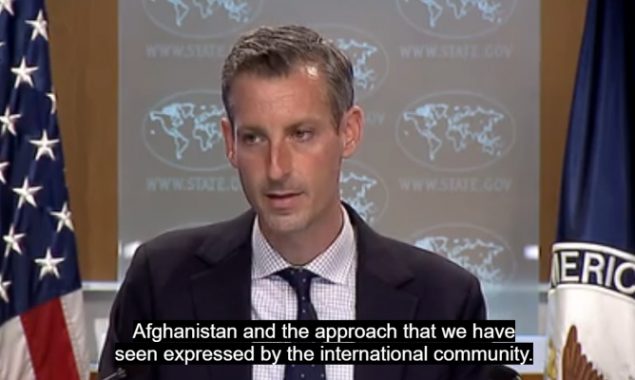
Spokesperson Ned Price leads the US Department Press Briefing on November 9, 2021. Image: Screengrab
The United States has refused to give any “specific reaction” to Pakistan’s talks with the banned Tehreek-e-Taliban Pakistan (TTP) adding that the two countries still had “alignment of interest” on Afghanistan.
During a US State Department press briefing on Wednesday, Spokesperson Ned Price said, “If we [the US] have a specific reaction on the Pakistani dialogue with the Pakistani Taliban, we’ll, of course, let you know.”
Earlier this week, the government announced to have started talks with the banned TTP, possibly paving the way for its members, long branded an international terror group, to surrender and be given amnesty.
In a televised statement, Information Minister Fawad Chaudhry had said that TTP had promised a “complete ceasefire” that would hold as long as talks progressed.
Thousands of TTP fighters are believed to be in Afghanistan, mostly in the rugged eastern highlands neighbouring Pakistan, where they sought shelter after a military crackdown nearly a decade ago.
“But we have been in regular contact with the Pakistani leadership regarding the question of Afghanistan, regarding our approach to Afghanistan and the approach that we have seen expressed by the international community. We’ve had an occasion to speak to our engagement with Pakistan on this challenge before,” said Spokesperson Price when a journalist reminded him that the US still considered the TTP a terrorist group and asked for an official reaction to the talks.
“We [the US] have heard both publicly and privately from our Pakistani counterparts that they too have an interest in seeing to it that the gains, including among Afghanistan’s minorities, including among its women and girls, over the past 20 years not be squandered,” he said.
“And so there is quite a bit of alignment of interest when it comes to Afghanistan, and we’re continuing to have those conversations.”
“Tom West, our new special representative for Afghanistan, will be in a position to continue some of these discussions in the days ahead,” added Price.
The banned TTP
Formed in 2007 in the tribal South Waziristan district, the banned TTP has been involved in numerous attacks, including suicide bombings inside Pakistan. The Hakeemullah Mehsud and Gul Bahadur groups are the two main entities within the TTP.
It was responsible for plunging the country into its most violent period after its formation in anger at Islamabad’s support for the US and its war against terror. The network later moved to North Waziristan following a Pakistan Army onslaught on South Waziristan in 2010.
Its 2012 shooting of Nobel peace prize winner Malala Yousafzai – then a student in a border region under the control of the militants – shocked the world. But it wasn’t until the massacre of nearly 150 children at the Army Public School (APS) in Peshawar two years later that authorities moved forcibly.
A large-scale army operation in 2014 pushed the banned TTP towards neighbouring Afghanistan.
Peace talks between Islamabad and the TTP have been held several times since 2007 but failed to produce results.
Catch all the Pakistan News, Breaking News Event and Latest News Updates on The BOL News
Download The BOL News App to get the Daily News Update & Follow us on Google News.




